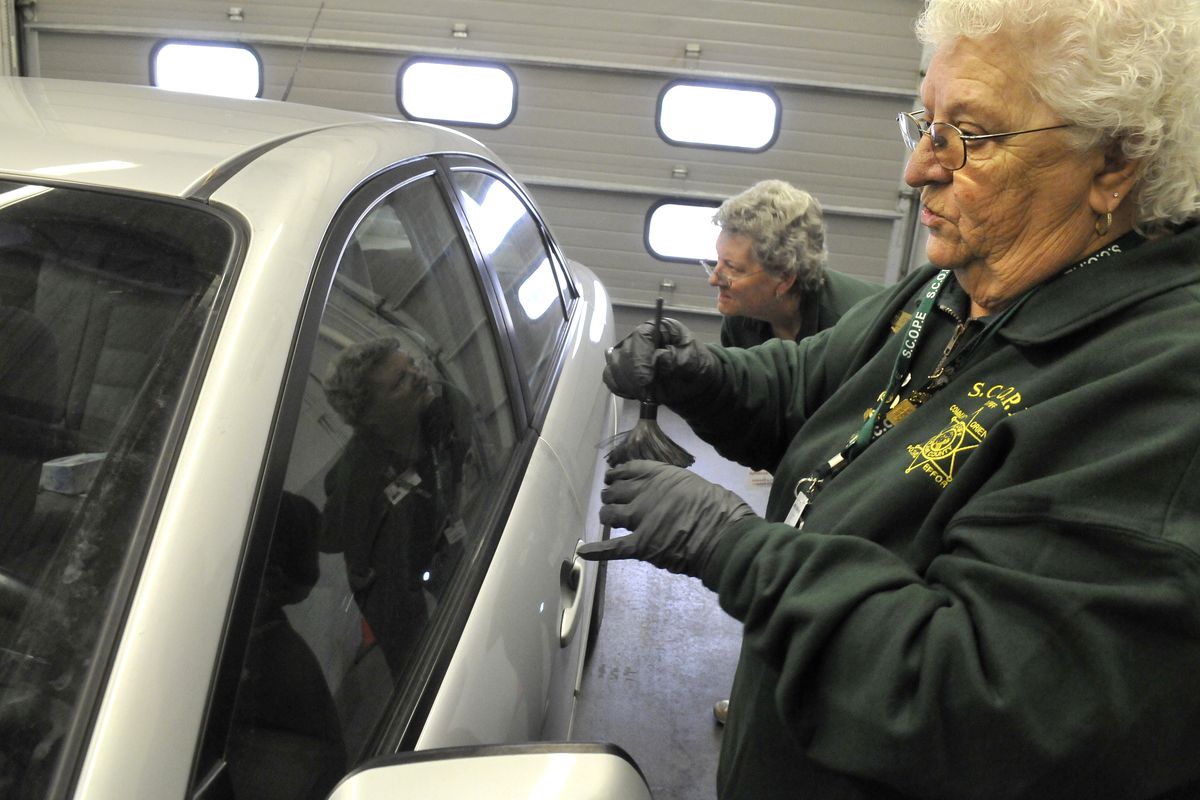Dusting for prowlers’ prints
Trained SCOPE volunteers gather evidence for deputies

Kristin Comstock went out to her car Saturday morning to find it had been ransacked.
When she called Crime Check to file a report, they asked if she would like to have the car dusted for the perpetrator’s fingerprints.
“I was like, ‘Yeah, sure,’ ” Comstock said. “I’ve had my car broken into before and this wasn’t an option. I might as well try.”
The thieves stole a laptop computer, a GPS unit and an iPod docking station as it sat parked near Fourth Avenue and Sullivan Road in Spokane Valley.
On Monday, Comstock brought it to the Spokane Valley police headquarters, where it was inspected by volunteers on the Latent Prints Team. That team is a service provided by the Sheriff Community Oriented Policing Effort, or SCOPE.
Having trained volunteers take care of fingerprinting allows deputies – who staff the Spokane Valley Police Department – to focus on higher-priority crimes, said Randy Dale, the print team coordinator.
“The deputies just don’t have time,” Dale said. “They don’t have the manpower to go out and check every single car.”
Volunteers Donna Goff and Rhonda Gore have dusted hundreds of vehicles for fingerprints in Spokane County. The Spokane Police Department’s volunteer arm, Community Oriented Policing Services, or COPS, provides a similar service.
Volunteers are trained and certified by members of the departments’ forensics units to lift prints. They keep meticulous records of the work and are able to testify in court, though so far, none of the volunteers have been called on to do so.
“Certain policies and procedures have to be followed,” Dale said. “We have a chain of evidence we have to follow. Everything is well-documented.”
On Monday, Goff and Gore carefully dusted areas of Comstock’s car likely to have prints and used tape to lift them off.
The prints were placed on white cards, where the details become more visible.
“You can see a little ridge definition on the edge,” Goff said, pointing to one of the smudged prints.
“But I don’t think there’s enough to do anything.”
This time, they weren’t able to lift any good prints.
“It’s a hit and miss,” Dale said.
In 2012, the team received 1,100 requests to dust for prints. The program was resurrected in spring 2010 after going on a hiatus in the 1990s.
In the past, volunteers responded to wherever the vehicle was located, but now, Spokane Valley victims bring their vehicles to the Spokane Valley police headquarters for processing. That allows the work to be done in a controlled environment, instead of outside in the elements.
“It’s much easier for us to be thorough and go over the vehicle really well,” Dale said.
If the vehicle prowling happens in a more remote area of Spokane County, volunteers are dispatched to the scene.
Once the volunteers lift prints, they send them to forensics, and the prints are run through the Automated Fingerprint Identification System. The success rate is about 1 percent, but Dale said it’s important to show the community that authorities are doing what they can to investigate property crimes.
Seasoned volunteers like Goff and Gore have learned how to identify good prints, saving forensics personnel time by not submitting those that are smudged or incomplete. A good print has well-defined ridges, the unique identifying lines.
Though the process of fingerprinting isn’t difficult, finding a usable print can be.
Gore and Goff estimate they find an average of about two usable prints per vehicle.
The team has logged thousands of hours processing vehicles including cars, boats and motor homes.
“I think the funnest thing we fingerprinted was a Cobra,” Gore said.
Goff added, “I told him I can’t fingerprint it until I drive it.”
“I really enjoy doing it,” Goff said. “It’s a good day when you can lift a good print.”